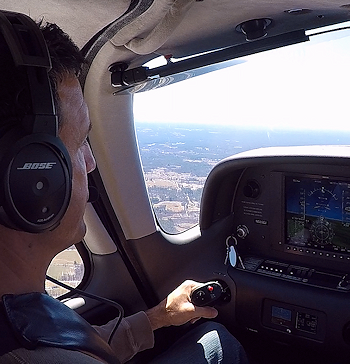Subscriber question:
"When ATC calls traffic for me, I never see it until I’m passing it, even when it's at or near my altitude. Is there any trick to this? " — Shawn R.
Jeff:
 “The best advice really comes down to angles.
“The best advice really comes down to angles.
Suppose traffic is called out to us at 12 o’clock, five miles, same altitude. Instinctively, we look to the horizon because we’re terrestrial beings most of the time and that’s where we think we are. However, that’s not quite correct due to the curvature of the earth. Even only 1000 feet in the air, the horizon in the distance is 1.5 degrees below level. By 10,000 feet, that’s about two degrees, and by FL410 it’s about 3.5 degrees.
Two degrees is about the width of one finger held out at arm’s length. So if we’re flying at 10,000 feet or lower, we need to hold our arm out in front of us at arm’s length and put the bottom of our finger on the horizon. The traffic is somewhere behind that finger—which is a really small slice of the sky just above the horizon. Put the finger down now and look for traffic right there.
Suppose the traffic call was 12 o’clock, five miles, 1000 feet below. Would you look much lower? Not really. A point 1000 feet below you and ten miles away is only one degree down visually. So 1000 feet below and five miles away is two degrees down. If traffic at your altitude is directly behind your finger held at arm’s length, then traffic five miles away and 1000 feet below is just below your outstretched finger. Traffic five miles away and 1000 above, is a just above that finger.
In other words, look for traffic two finger-widths above the horizon to one finger width below. That’s where all the traffic is that matters when it’s approaching—and where it will stay if it really matters!”
If ATC calls out traffic that you locate on your avionics (iPad, MFD, GPS), but you can't see out the window, is it OK to say you see the traffic?
